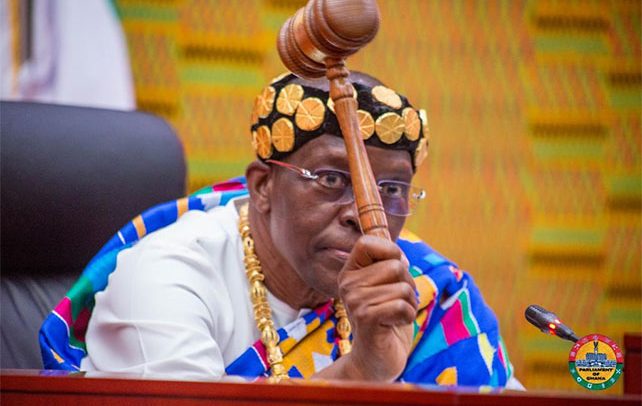The Speaker of Parliament, Alban S.K. Bagbin has described the comments made by President Nana Addo Dankwa Akufo-Addo on the Supreme Court verdict of giving the green light to the Deputy Speakers to also vote while presiding as “a myopic and unfortunate”.
According to the Speaker, the President’s comments only go to worsen the schism between the Executive and Parliament.
President Nana Addo Dankwa Akufo-Addo, on Thursday, said the decision of the Supreme Court on the voting rights of Deputy Speakers cannot amount to judicial inference in the work of Parliament.
According to President Akufo-Addo, the suggestion that Parliament is beyond the scrutiny of the Supreme Court is to suggest that Parliament is a law onto itself.
“I’m not sure people who are saying this have taken the time to read the Constitution of our country. It says so in Black and white. The legislative powers of the State, which are vested in Parliament, are subject to the provisions of the Constitution. All organs of the Ghanaian State, including me as the Head of the Executive, we are all subject to the teachings of the Constitution,” the President said.
He continued, “There is nobody in the Ghanaian State that is above the fundamental law of the land. It will lead to the very matter that we have striven so long to avoid – the concentration of unregulated power in our state – we don’t want that. And we brought about this Constitution to allow that not to reoccur.”
Astonished by the “public energy” dissipated in the debate, he was happy with the unanimity of the decision taken by the Supreme Court, especially as it is the most emphatic way in which the Court can pronounce.
Touching on suggestions that Parliament is beyond the scrutiny of the Supreme Court regarding issues of interpretation, the President indicated that “the whole principle of judicial review was developed by the judges, both in America and England, to be able to check the activities of Parliament.”
Indeed, in Ghana, he stated that the first major constitutional case, which looked at the work of Parliament was in the case Tuffuor vs Attorney General, where the Act of Parliament, the decision of the Parliament to subject the then Chief Justice, the late Frederick Kwesi Apaloo, to a vetting process in Parliament had been expressly forbidden by the Constitution”.
“And that is the reason why the late Dr. Amoako Tuffuor took the matter to the Supreme Court, and the Supreme Court made it quite clear that all the activities of all the institutions of our Republic that impugn, that violate the Constitution are subject to the powers of the Court and the Declarations of the Court,” he said.
President Akufo-Addo continued, “Me, I wat to repeat it, as President, Head of the Executive, I am subject to the Constitution and law. I cannot set myself above it. Everybody has his remit, but those remits are subject to the operations of the Constitution, and I am happy that the Constitution has been so declared in such an emphatic manner by the Supreme Court, I support the Supreme Court to continue to do its work.”
However, in a response after the NDC led by President John Mahama launched scathing attacks on the Judges, the Speaker, also said “I have resisted the temptation of commenting on the judgment of the Supreme Court on the issue of the voting rights of Deputy Speakers when presiding. But the unfortunate and myopic comment of the President has compelled me to let it out”.
According to the speaker “the SC decision, is, to say the least, not only an absurdity but a reckless incursion into the remit of Parliament. The trend of unanimity is equally troubling. It doesn’t help explore and expand our legal jurisprudence”.
Alban Bagbin explained that the impartiality of the Speaker, Deputy Speaker, or Presiding Officer has been treasured and fought for by this country throughout our democratic development.
“Mr. President, the issue being discussed is not about Parliament being above the law. Everyone knows that Parliament is not above the law. The Executive and the Judiciary are equally not above the law”.
“The issue being discussed is the political question doctrine. It took centuries to detail out the strands of this doctrine and the principles are settled as to when and how this closed book could be opened” he added.
However, the Speaker further encouraged Plaintiff to go for a review.

– BY Daniel Bampoe


